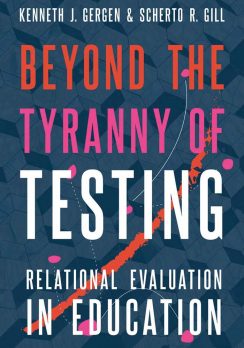Publisher
OUP USA
ISBN 10
0190872764
Published
17 Dec 2020
James Mannion’s review finds a book that doesn’t pull its punches in its effort to convince us to rethink our assessment regime
I know strong language isn’t to everybody’s taste, but if I’m honest they had me at tyranny. It may not be original – Warwick Mansell published Education by Numbers: The Tyranny of Testing in 2007, for example – but sometimes, things bear repeating.
‘Tyranny’ has several definitions. One of them is ‘an oppressive, harsh or unjust act’, usually by people in positions of power. For many students, GCSEs are an emancipatory mechanism – keys that open the door to their future pride and prosperity. But for the third of students the system is designed to fail; for those who suffer with serious mental health issues around exams; and for the estimated 40 per cent who underperform on the day, for example – the GCSE could fairly be described as ‘oppressive, harsh and unjust’. To this list, we might add profoundly unethical, damaging and unnecessary. Because it doesn’t have to be this way. It really doesn’t.
It isn’t enough to call for the exams to be scrapped. You need a plan for what to replace them with. Beyond the Tyranny of Testing begins to do just that. Gergen and Gill draw together a range of tried-and-tested alternatives from around the world – practices that centre around what they describe as ‘relational evaluation’.
In truth, this is more the beginning of an essential conversation than a detailed blueprint. Beyond the tyranny of testing does not present us with a comprehensive solution to our predicament, and educational conservatives will find plenty to criticise. With references to Ken Robinson, cookie-cutters and factory assembly lines, the book includes many of the buzz phrases educational traditionalists disdainfully dismiss.
This book is trying to build a picture of what’s possible if we start from a different premise
But you’re never going to satisfy everyone with a word like ‘tyranny’ in the title – and nor should you try. This book is trying to build a picture of what’s possible if we start from a different premise. It takes as a truism the notion that knowledge has enabled humanity to create amazing things like the internet. But what that invention reveals to the average user in under five minutes is that we haven’t quite got the hang of getting along with one another yet. At least, not at scale. So what can we do about it?
In schools, we treasure what we measure: what gets assessed is what gets done. Gill and Gergen’s key insight is sublime in its simplicity: if we need people to learn how to get along with one another better – and we really, really do – then we need to start prioritising, teaching and celebrating the development of prosocial behaviours in school assessments. Like, pronto.
Language is important, as ever. Gill and Gergen prefer the word evaluation to assessment on the basis that the former is “a process of valuing, or appreciating the value of something. This enables us to replace the traditional focus of assessment on student deficiency—pointing to where students have fallen short of perfection—with an emphasis on opportunities, possibilities, and potentialities for growth and well-being.”
This all sounds lovely, you might be thinking – but what does it look like in practice? Well, this is the book for you. With chapters on relational evaluation in primary and secondary education – as well as exploring relational approaches to evaluating teaching and schools themselves – there is no shortage of ideas here. And it isn’t just hippyish stuff about ‘getting along with one another’; the practices assembled here also address traditional concerns like the development of literacy, numeracy and subject knowledge.
The Covid pandemic has given many people pause to reflect on how we educate young people and how we assess their learning. In many countries around the world, parents, teachers and young people themselves are arguing forcefully that the time has come to rethink education – and to rethink assessment, in particular.
The answers may not be in the room. But many of them are in this book. I cannot recommend it highly enough.













Your thoughts